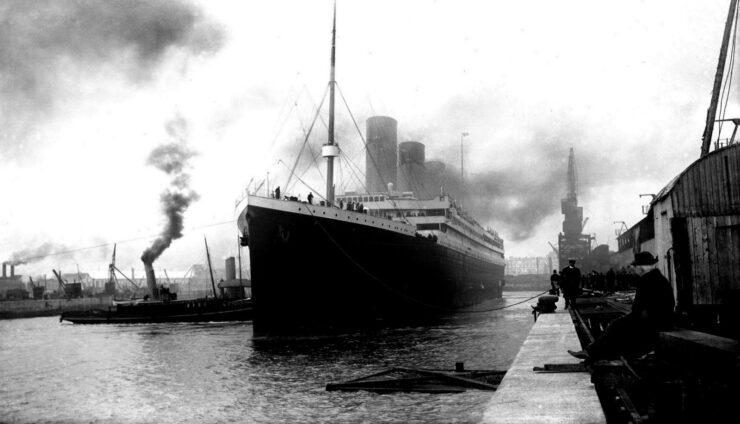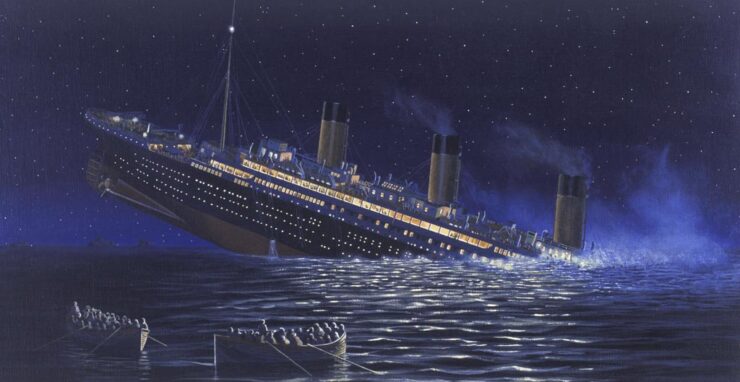Henry Tingle Wilde was born in Liverpool on 21st September, 1872. He had begun his career at sea in his teens aboard traditional old-fashioned sailing vessels. But once Wilde had gained his all-important masters certificate, he had joined the White Star Line, and left the old square-rigged ships far behind.
Henry Wilde rose steadily, as all good officers do, through the ranks and ships of the White Star Line. His postings included Arabic, Celtic, Medic and Cymric, and in 1911 Henry T. Wilde was posted aboard Olympic as her Chief Officer, making him second-in-command on the world’s largest ship at that time, quite a position to hold. Ironically, this appointment placed him directly under the command of Captain E. J. Smith, something they would get to repeat aboard Titanic less than a year later. Of course, it was whilst Wilde was Chief Engineer aboard Olympic that the collision with H.M.S. Hawkeoccured in September 1911.
April, 1912

Henry Wilde was due to leave Southampton aboard Olympic the previous week to Titanic’s maiden voyage, however, he received word from the White Star Line to remain in Southampton and await further orders, and Olympic sailed without him. There must have been an element of doubt regarding Wilde’s next posting, because he didn’t actually join Titanic until the day before she sailed.
Surely if Wilde’s next posting was cut and dried, then he would have joined Titanic on the 3rd or 4th of April, not the 9th? Wilde’s inclusion in the crew led to the infamous ‘officer reshuffle’, which saw David Blair excluded from the ship, and officers William McMaster Murdoch & Charles Herbert Lightoller knocked back from Chief & First Officers to First & Second Officers respectively.
April 10th, 1912 was of course the date of Titanic’s maiden voyage departure from Southampton. Henry Wilde had come on duty at 6.00a.m., and would be ship’s senior officer until the arrival of Captain Edward John Smith at 7.30a.m. During the morning, Wilde would have been receiving reports from the department heads, and would then pass these on to Captain Smith. Later on, nearer Titanic’s departure time, Wilde, together with Second Officer Charles Herbert Lightoller, were both employed on the forecastle supervising the work of the deck-hands involved in fastening lines to the various tugs, as well as detaching the mooring ropes from the dock-side.
April 14th, 1912

As Titanic continued her uneventful passage across the North Atlantic to New York, the often-monotonous work of the officers and crew continued unabated as before. At 2p.m., Henry Wilde relieved First Officer William McMaster Murdoch on the bridge. The four hour stint was uneventful, and at 6p.m., it was Henry Wilde’s turn to be relieved, this time by Second Officer Charles Herbert Lightoller.
Because Wilde was off-duty at the time of the collision, and also because he didn’t survive to tell the tale, his whereabouts are largely unknown, although he did talk to Albert Haines and Samuel Hemmings shortly after the collision. They told him that they could hear air could be heard eminating from the forepeak tank, and Wilde decided to report his findings to Captain Edward John Smith on the bridge.
Not long after Captain Edward John Smith and Thomas Andrews had returned to the bridge after their tour of Titanic’slower decks, the order was given to uncover the lifeboats, and Chief Officer Wilde was given the task of overseeing the loading and lowering of the even-numbered boats on the port side of the ship.
By 1.40a.m., most of the port-side lifeboats had been lowered, and Wilde moved to the starboard side to assist with the remaining boats located there. Collapsible C was now fitted into the davits vacated by the starboard Emergency Cutter. A request from Henry Wilde for any more women and children to step forward into the lifeboat went un-answered, so he ordered the lifeboat away. Just as it was being lowered, Joseph Bruce Ismay, who had been helping to load the lifeboats on the starboard side, stepped forward and got into the lifeboat, along with William Carter who was also stood nearby.
Of course, Ismay would be branded a coward, and worse, for the rest of his days and beyond.

